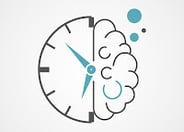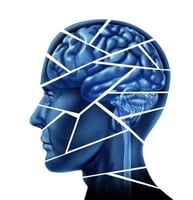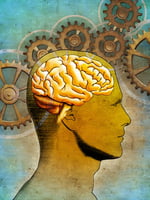Multifamily group treatment for veterans with traumatic brain injury (TBI) appears to be useful and...
COVID Pandemic Accelerated Brain Aging, Even Among Uninfected

The COVID-19 pandemic accelerated brain aging by several months, even among individuals who did not get infected with the virus, according to a study published today in Nature Communications.
“The neuroinvasion of SARS-CoV-2 is well established, with virus persistence detected up to 230 days post-infection,” wrote Ali-Reza Mohammadi-Nejad, Ph.D., of the University of Nottingham, England, and colleagues. “Understanding the pandemic’s effects on brain health, considering infection status and socio-demographic factors, is crucial for addressing its long-term health consequences and broader public health implications.”
The researchers made use of extensive brain imaging data available in the UK Biobank to develop and train a brain-age prediction tool. The tool was then used to assess changes in brain age in 996 middle-aged and older adults (average age of 59) without chronic disease who received two MRI scans about three years apart. Of these, 564 adults received both scans before the onset of the pandemic in March 2020 (control group), while the remaining 432 received their second scan after pandemic onset (pandemic group).
The researchers next calculated the brain age gap (BAG)—the difference between an individual’s chronological age and brain age—for all the adults at both time points. While the two groups were evenly matched at baseline, at the follow-up scan, the average BAG for the pandemic group was 5.5 months greater than for the control group. Accelerated brain aging was more pronounced in males, older adults, and individuals with sociodemographic deprivation (lower scores on employment, education, and/or housing indices).
However, while brain age accelerated across the pandemic group broadly, only those individuals who reported being infected with the coronavirus experienced reductions in cognitive measures such as mental flexibility and processing speed at the second time point compared with the control group, with more pronounced changes again observed in older adults.
“Our findings provide valuable insight into how the COVID-19 pandemic affected brain health, demonstrating that the general pandemic effects alone, without infection, exerted a substantial detrimental effect on brain health, augmented by bio-social factors (age, health, and social inequalities),” Mohammadi-Nejad and colleagues wrote.
For more information, see the Psychiatric News article “Measurements of Brain Age May Help Target Therapy.”
(Image: Getty Images/iStock/Sibani Das)
Don't miss out! To learn about newly posted articles in Psychiatric News, please sign up here.





